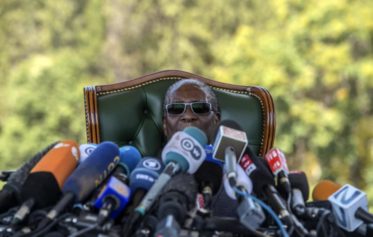Talk about embarrassing: Zimbabwe’s finance minister made the admission to journalists yesterday that after the government paid its civil servants last week, it had just $217 left in its bank accounts.
But after that scary news quickly spread around the world, Finance Minister Tendai Biti said the stories were distorting the point he was trying to make. He said he was just trying to note that Zimbabwe could not afford to pay the $106 million it would cost to pay for new elections — not that the country was completely broke. He said the day after the account hit $217, the country received $30 million in payments.
“You journalists are mischievous and malicious — the point I was making was that the Zimbabwean government doesn’t have the funds to finance the election, to finance the referendum,” he said. “To dramatize the point, I simply made a passing reference metaphorically that when we paid civil servants last week on Thursday we were left with $217… but even the following day we had $30 million in our account.”
His last point likely will be lost on much of the world community, which has run with the story about the broke African country and turned it into an international joke, with bloggers writing posts advising the government on how to live on $217.
“The biggest problem with all the ‘fiscal cliff’ struggles and debt haggling had been the sheer volume of money we were talking about. Billions? Trillions? At a certain point, it all becomes vanishingly remote,” wrote Alexandra Petri, in a blog for The Washington Post that was typical. “I have no idea what you should do with $1 billion … I have never been in a position to advise a whole country on its finances before, but I know what it is like to have only $217 in your coffers. This is a dollar amount around which I can wrap my head!”
Zimbabwe’s economy has been in desperate straits for much of the last decade. Many of the problems have been attributed to longtime President Robert Mugabe, who drew a slew of international sanctions, a loss of international investors and devastation to the tourism industry when he seized white-owned farms.
The international response to Mugabe’s move resulted in the economy shrinking by half. Zimbabwe was the center of more international ridicule when its currency was inflated by 231,000,000 percent — at one time, the Zimbabwe currency included 100 billion-dollar bills — leaving millions starving. Observers note that the adoption of the U.S. dollar and South African rand have brought some stability to the economy, with a national budget this year of $3.8 billion and economic growth estimated at 5 percent.
But according to the UN, Zimbabwe will need at least $131 million in aid this year, mainly for food assistance after a failed farming season left nearly 1.7 million people facing hunger.
“There have been some assertions that the economy is getting better, but as ordinary people we have not been seeing it,” said McDonald Lewanika, director of the Crisis in Zimbabwe Coalition. “Without foreign direct investment coming in and with some companies leaving because of uncertainty, I wonder where these assertions come from.”
And then there’s the question of what happened to the money from vast diamond sales. While Biti said the treasury received just $40 million last year from the diamond industry, the watchdog group Partnership Africa Canada said last November that at least $2 billion worth of diamonds had been stolen by Mugabe’s ruling elite, international dealers and criminals in “perhaps the biggest single plunder of diamonds the world has seen since Cecil Rhodes.”

